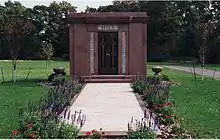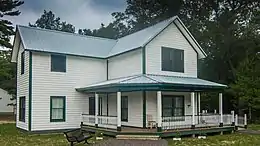George Edward Hilt
George Edward Hilt, also known as George E Hilt or George Hilt (March 7, 1916 – October 2, 2012), was a businessman and philanthropist. Many of his financial gifts were for the benefit of Muskegon and Whitehall, Michigan. He developed out an art museum and a historic park open-air museum that cost millions of dollars.

Hilt started his business career selling farm merchandise and equipment from a renovated grocery store. He developed this into the Quality Farm and Fleet store chain, which briefly became the United States' largest farm-store retailer. It had sales of over a billion dollars annually from its hundreds of retail outlet stores in several states.
Hilt served in the United States Army during World War II during the D-Day invasion. He was a truck and watercraft driver when assigned to general George S. Patton's unit.
Early life
Hilt was born in Muskegon, Michigan, on March 7, 1916. His parents were John and Margaret Hilt. Hilt had an older sister, Marguerite. He also had four older brothers, Charles, Wayne, Raymond and Robert and a younger brother, Jack.[1][2]
Mid life
Military
Hilt was in the United States Army from 1943 to 1945 during World War II. He was in the Third Army, Seventh Corps, Quartermaster Corps in the European Theater. Hilt was an amphibious landing craft and supply truck driver. He had landed at Omaha Beach one day after D-Day and was in charge of a landing craft filled with five-gallon cans of gasoline. Seven days after D-Day he became a supply truck driver and his assignment was to follow General George Patton's unit into Germany.[1][2]
Career
.jpg.webp)
Hilt with his younger brother, Jack, worked in their family hardware business in Muskegon. Here they received training in business management.[3] With these skills they decided to open a retail store chain that sold farm equipment and merchandise. They started Quality Farm & Fleet Supply.[4] Their first store was a 4,000 square foot renovated grocery store and opened in Hudsonville, Michigan, in 1962.[5][6] Hilt and his brother decided to move their business that was near Grand Rapids, Michigan to Norton Shores, Michigan, about 30 miles to the northwest of where they were then located. In 1976 they started an Employee Stock Ownership Plan that allow an employee with over 1,000 hours of working time to join.[7] They retired in 1986.[4] The business enlarged to 100 company stores by 1996. They had a 450,000 square-foot distribution center in Fostoria, Ohio.[8]
The chain merged in 1999 with Central Tractor Farm & Country of Iowa to form Quality Stores that became 360 retail outlets in 30 states with over a billion dollars in yearly sales.[9] It became the largest farm-store retailer in the United States.[10][11][12] Management problems developed and in November 2001 they filed for Chapter 11 federal bankruptcy protection. They immediately closed 133 stores. They had 178 stores still operating, most of which were east of the Mississippi River.[13] This entire enterprise was sold to Tractor Supply Company in 2002.[14][15]
Philanthropy
Hilt was one of the founders of the Community Foundation for Muskegon County through the Hilt Foundation. Hilt formed the foundation in 1986. The first gift was the Hilt Building located in the center of Muskegon. Another donation Hilt gave was for over 100 pieces of Japanese Sumida Ware given to the Muskegon Museum of Art. One part of the donation was in 1997 and another in 2008.[4]
Michigan Heritage Park

A 300-acre (120 ha) property was bought in the mid-1920s by Hilt's father in the Whitehall area on the White River where it flows into White Lake. Hilt remembers the family cottage that used to be on the property where the family grew up. George and his siblings in 1979 made the decision to sell the family’s property to Muskegon County, Michigan. Later Whitehall Township decided to buy it and obtained financial assistance from The Hilt Foundation. A new plan for the property was envisioned.[16]
The Muskegon County Museum in partnership with the Hilt Foundation decided a historic park would be in order. The park itself was to take up ten acres of the property and the remainder of the property would be left as natural space. Hilt made the contributions necessary for the unfolding and initial construction of the Michigan Heritage Park through the foundation. He created two funds at the Foundation that would divide the funds to build, operate, and maintain the Michigan Heritage Park (also known as The Trail at Hilt’s Landing). The Museum oversees any construction and operates the half-mile walking trail and its exhibits maintenance. Hilt’s charity donated over two million dollars for the Michigan Heritage Park. A portion of the donation went to building the historic park that is being done by the Lakeshore Museum Center, and another portion of the funds went for the operation and maintenance of the facility.[1]
Personal life
Some of Hilt's hobbies were playing cards, traveling, golfing, and fishing. He also took an interest in Hawaii and its people.[1] His first wife was Martha Monroe Hilt whom he married May 16, 1939, when he was 23 years and she was 22 years old. Martha died March 30, 1996, at age of 79. He remarried to Betty Jean Hilt.[12]
Death
Hilt died October 2, 2012, in Juno Beach, Florida, at age of 96.[12]
References
- Alexander, Dave (March 7, 2013). "Muskegon's year of giving: The late George Hilt supported plans for historic park, much more". MLive Media Group. Muskegon Chronicle. Retrieved October 7, 2015.
- ""George Hilt" – Life Story / Obituary". Clock Funeral Home. LifeStoryNet. 2015. Retrieved October 7, 2015.
- "Business Brief / Quality Farm & Fleet Supply". Livingston County Daily Press and Argus. Howell, Michigan. June 4, 1997. p. 52 – via newspapers.com.
- Champion, Brandon (June 11, 2015). "The modern-day Charles Hackley? Final gift inspires comparisons to Muskegon legend". MLive Media Group. Muskegon Chronicle. Retrieved October 7, 2015.
- "The first Quality Farm & Fleet Supply". The Call-Leader. Elwood, Indiana. May 14, 1997. p. 5.
- Alexander, Dave (April 16, 2011). "A New Quality: Family Farm & Home has brought the Fansler family together in retailing". MLive Media Group. Retrieved October 7, 2015.
- "Farm & Fleet". The Newark Advocate. Newark, Ohio. October 5, 1988. p. 5.
- "Quality Farm & Fleet wants people to love this store". The Daily American. Somerset, Pennsylvania. January 31, 1996. p. 59.
- Hogan, Jeffrey (2002). "Farm & Fleet". Petoskey News. Retrieved October 7, 2015.
- "Farm store merger: Central Tractor Farm & Country Inc. and Quality Stores Inc". Chicago Tribune – Evening Business. Chicago Tribune. March 29, 1999. Retrieved October 7, 2015.
- "COMPANY NEWS; CENTRAL TRACTOR TO MERGE WITH QUALITY STORES". The New York Times. Business Day. The New York Times Company. March 30, 1999. Retrieved October 7, 2015.
- Alexander, Dave (October 7, 2012). "George Hilt dies in Florida at the age of 96; he built Muskegon-based national retailer Quality Stores". MLive Media Group. Muskegon Chronicle. Retrieved October 7, 2015.
- "TSC to acquire Quality Farm & Fleet". Livingston County Daily Press and Argus. Howell, Michigan. January 3, 2002.
- "Tractor Supply to buy 85 stores". Times Daily. Florence, Alabama. January 3, 2002. Retrieved October 8, 2015.
- Forrester, Brian (May 12, 2002). "Tractor Supply plows Quality row to growth". Nashville Business Journal.
- "A New Vision for Hilt's Landing". Community Foundation for Muskegon County. 2015. Retrieved October 7, 2015.